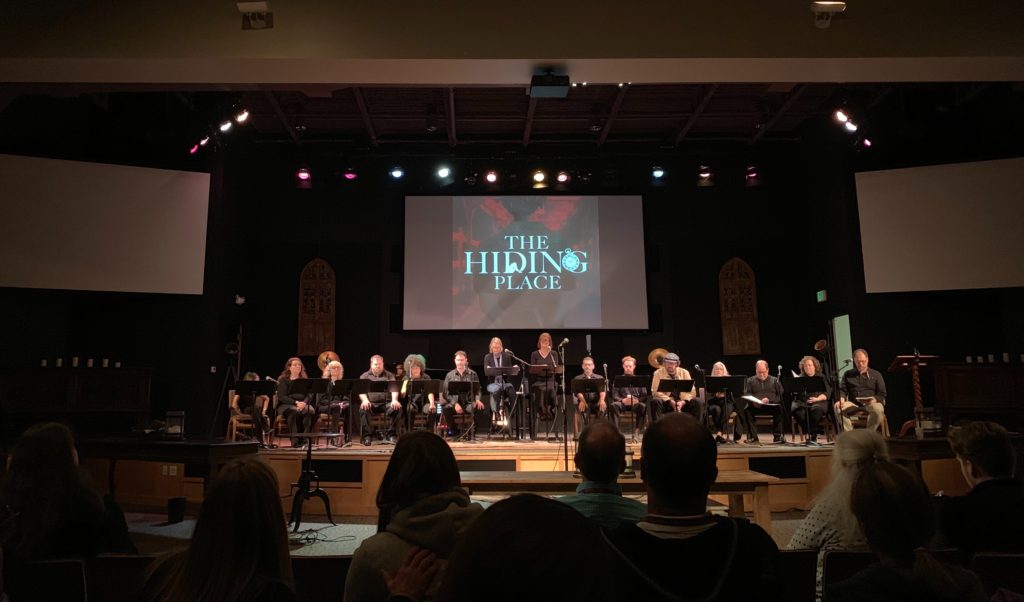You Didn’t Know My Grandma
 You didn’t know my Grandma. I mean, perhaps you did—I do think she had outsized influence for a girl who grew up without a daddy in Manheim, Pennsylvania—but as a whole, she lived her life outside the notice of the world. It was a small, faithful life, rich in family and hospitality and love—for Jesus and her fellow man.
You didn’t know my Grandma. I mean, perhaps you did—I do think she had outsized influence for a girl who grew up without a daddy in Manheim, Pennsylvania—but as a whole, she lived her life outside the notice of the world. It was a small, faithful life, rich in family and hospitality and love—for Jesus and her fellow man.
“If your ambition is to leave a legacy,” Rich Mullins said, “you will leave a legacy of ambition.”
I went to Hutchmoot this weekend. That makes eight years now of going to a place that reminds me who I am and reminds me over and over of the scandal of the gospel: that the King of the Universe became a carpenter’s son and lived and died and rose again for you and me.1
“God did not abolish the fact of evil,” Dorothy Sayers wrote, “He transformed it. He did not stop the Crucifixion; He rose from the dead.”
We looked carefully at what it means to be part of a creative community, how the whole body, joined and held together by every supporting ligament, grows and builds itself up in love.
“When you find something you love,” said Bailey McGee, “you want to be a part of it.”
We forget sometimes that we live in a Kingdom economy, one without scarcity. A flourishing Christian community is wonderfully counter cultural. In the Kingdom of God, when one of us wins, we all win. But the key to this kind of community is a heart of service—whatever gift we have, we use it to serve others.2
“What do I have,” Doug McKelvey challenged us to ask ourselves, “that I can use to serve this vision?”
It’s not just about creativity, either. This Kingdom economy shows up when we love, too. God is love, and when we love he fills us up ever more with love.
“Any form of prejudice goes against the grain,” Odessa Settles said, “because I don’t believe that’s what God intended.”
God intended love, service. Don’t forget the alien, he commanded Israel, for you were once aliens. Don’t forget the slave, he said, for you were once slaves. The wounds are deep, all around. And those who must repent of a lack of love, a lack of service are standing today side by side with those who were not loved, who were not served, creating together for a new world.3
“Music is the needle,” Suzanne Tietjen said, “that drags the suture to the wound, to do the work.”
We all get spiritual formation—our will, our loves, our desires, all of them are formed. But we live in this achingly beautiful and tragically broken world, so we get spiritual malformation. And it is only Christ-centered spiritual formation that allows us to be re-formed. The more we look like him, the more truly human we become.4
You didn’t know Grandma Givens, but going by that definition, she was one of the most human people I ever met. The other day she would have been 101 years old, but she celebrated that birthday with the Jesus she spent her life following. She walked on this earth for 100 years and was the joints, the ligaments, the ear, the elbow, all the “less honorable” parts every single day.
“Our hospitality shall be our protest,” said Betsie ten Boom.
We finished the weekend with a reading of A.S. Peterson’s The Hiding Place. It’s been decades since I read the book, but I remember it often sitting by Grandma’s chair over the years.
“I can think of no better work than making our home a refuge for those in need,” Caspar ten Boom said.
“If the Germans can learn such hate,” said Betsie, “think of how they could learn to love.”
You didn’t know my Grandma. She didn’t leave too large a footprint in the world. But Betsie ten Boom did. She loved. She loved people. She loved God’s Word. She described it as “A promise that the lightning crack of justice has already struck and we live in the silence before the thunderclap.”
And she had a sister, Corrie—a passionate, driven, transformed woman who told her story, and her sister Betsie’s story. Who learned that forgiveness is never efficient, that it must be a scandal.
You didn’t know my Grandma, but I hope you get to know Betsie, for Grandma was so much like her.
1Andrew Peterson, “Honesty, Truth, and Beauty: A Celebration of the Music of Rich Mullins.”
2Doug McKelvey, “Midwife Crisis.”
3Buddy Greene and Odessa Settles, “We Help Each Other See.”
4Carolyn Arends, “The Arts as Allies in Spiritual Formation.”

